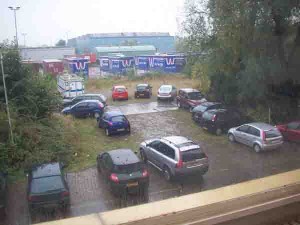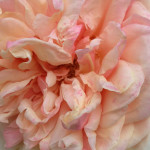A weekend filled with art - Zaltbommel Kunstrondje XL - and opportunities to visit houses…
Consult the Genius of the place

 What I nice crop of cars I grew! What do I want with this space, a space that proclaims to the world ‘I am a parking lot’. What I want to do is change my – and other peoples – perception of this space. In Mika Hannula’s terms: I want to make this space into a place.
What I nice crop of cars I grew! What do I want with this space, a space that proclaims to the world ‘I am a parking lot’. What I want to do is change my – and other peoples – perception of this space. In Mika Hannula’s terms: I want to make this space into a place.
I will appropriate this space because I need room to experiment. But how much will this space allow, how much am I entitled to do here?
I will put a few quotes from ‘Second Nature’ here, as they reference these questions:
page 95: “To look at a flower and think of sex – what exactly can this mean? Emerson wrote that ‘nature always wears the colors of the spirit,” by which he meant that we don’t see nature plain, onty through a screen of human tropes. So in our eyes spring becomes youth, trees truth, and even the humble ant becomes a bit-hearted soldier. And certainly when we look at roses and see aristocrats, olo ladies and girl scouts, or symbols of love and purity, we are projecting human categories onto them, saddling them with the burden of our metaphors.”
page 131: “You might say that the green thumb gardens with a greater-than-ordinary measure of what Keats’ seeking to account for Shakespeare’s genius, called negative capability – the ability to exist among ‘uncertainties, mysteries, doubts, without any irritable reaching after fact and reason. “ The green thumb is equable in the face of nature’s uncertainties; he moves among her mysteries without feeling the need to control or explanations or once-and-for-all solutions. To garden well is to by happy amid the babble of the objective world, untroubled by its refusal to be reduced by our ideas of it. Its indomitable rankness. Can there be much doubt that Shakespeare had a green thumb?”
page 131: “But though the green thumb’s approach to nature resembles the artist’s in some ways, it doesn’t necessary follow that he thinks of his garden as a work of art. He’s apt to be suspicious of the term, particularly of the closure or completeness it implies.”. ”The green thumb accepts that a garden is never finished, that though he may tame nature for a time, his mastery is temporary at best.”
Page 133: “There is a mood that sometimes overtakes you in the garden, a form of consciousness, even, that feels like nothing so much as a waking dream. I imagine most gardeners have known it at one time or another. Maybe it is a late afternoon in July, and you have been busy in the garden at a variety of small tasks – snipping the spent tomatoes just now setting fruit, cutting back a leggy nepata to promote a second bloom. You are working intently, and though sweat my be beading your brow, the work feels as effortless as puttering. Your tools ar light in your fingers and your fingers know what to do.” As your hand work the world retreats.” “The gardeners’ sublime, you might sya, and a very different one it is from the romantic’s version, awe-struck in nature and disarmed, or Zen’s hollowed-out egolessness.”
Page 148: “A garden that never died eventually would weary; maybe gardens require walls in time as well as space. The garden winter doesn’t visit is a dull place, robbed of springtime, unacquainted with the extraordinary perfume that rises from the soil after it’s had its rest. That promise, the return every spring of earth’s first freshness, would never be kept if not for the frosts and rot and ripe deaths of fall.
Page 228: “Maybe Hudson’s right and I should think of myself not as the master of this city of plants, but as its servant too – vector of interspecies DNA transfer, conveyor of information across vast stretches of space and time, means to an undreamed-of evolutionary end. Buzzing from catalogue to catalogue, dispersing seeds through the US Mail, bringing together far-flung genes in fresh combinations – I always thought I did these things just to please myself, but maybe it’s not that simple. Maybe you should call me Bumblebee.”
page 237: “The past – both the land’s and the gardener’s – exerts a certain pressure in any garden; indeed, many can be read almost as a form of historical or biographical commentary. It’s possible to interpret the lawns we inherited as a renunciation of the farm’s past, and my ripping out of these lawns as a repudiation of my own suburban past. This idea, that a garden comments on prior uses of the land, was well understood by Alexander Pope and his contemporaries as they set about inventing the picturesque style of landscape gardening in the eighteenth century – during that odd historical moment when the best minds of a generation were occupied with issues of garden design. The new taste for a more ‘natural’ landscape – for unfenced gardens with long prospects, curved paths, and ‘serpentizing’ waterways; for gardens, in other words, that strived to look noting like gardens – was in part a reaction against agriculture’s conquest of the English countryside, a process that was drawing to a close in Pope’s time. It was the enclosure of the nation’s fields in an orderly checkerboard of hedgerows that inspired a nostalgia for earlier, more natural landscape forms. “
Page 243: As everybody knows, it is not so much the eye that summons the gardens of chidhood, but the nose.” “Here, I think, is the deepest spring of the past’s power in the garden; gardening is one of the very few arts (cooking is another) to make use of the olfactory sense, to harness its uncanny knack for unleashing memory. Madeleines are everywhere in the garden (and surely Proust is its guardian spirit). “Another way of saying the same thing is that gardens are simultaneously real places and representations. They bring together, in one place, nature and our idea about nature. Like landscape paintings, gardens offer pictures of nature but, as the art critic Robert Harbison puts it, ‘unlike paintings, [gardens] let us forget that there is anything beyond’.
Page 244: “Less as a result of planning than chance, I discovered that a certain degree of formality could begin to supply the missing element [a quality of doubleness, of resonance]. By formality I don’t mean pergolas and fountains, or boxwood hedges and parterres, that kind of formality would be a joke around here. What I really have in mind, I guess, is form: straight lines and rectangles, repetitions and occasional symmetries, a few simple passages of what Le Corbusier calls mans’ language: geometry.”
Page 249: ‘that it [the herb garden] was a sort of hortus conclusus without the conclusus. These walled gardens commonly planted in herbs prized for their mystical or medicinal properties (..) offered a kind of refuge, a well-protected and scrupulously ordered place set apart from the dangerous and chaotic world that lay just over the wall. In medieval times, leaping the garden wall was the last thing anybody wanted to do.” “Though it has been largely forgotten since Le Notre, meditation is another way to leap the garden wall, one that is sometimes more appealing (not to mention more practicable) than conquering the whole countryside.”
page 251: “The eye, after spotting a cool gray clump of lamb’s ear in one corner of the garden, will then go off looking for it’s counterparts; if none is found, it will register a certain dissatisfaction – though we may never bee conscious of the cause. Once the gardener has started something, in other words, he had better figure out a way to finish it. Symmetry is probably the most basic form a garden can have – a sequence of visual expectations quickly and predictably paid off, as if the plants have been made to rhyme in couplets.
Such simple forms have an appeal all their own, but of the, it seems, our pleasure is increased by the introduction of complexity, and, specifically, of uncertainty – of some doubt as to whether the expectations that have been aroused will ever be fulfilled. To put form itself in jeopardy: this, too, seems to keep us interested, our minds alert.”
Page 254: “Look at how all of the forms I’ve introduced there – the dead-straight lines and walls and arbors, the symmetries and repetitions and paths – seem to profit from the contrast with the rougher land all around them, acquiring a savor they might not otherwise have had.” “But it’s not only the garden that gains from the rub against rough land –what’s even more surprising is how the rough land seems to profit from the contrast as well.”
Here is what I think I will start with. I will follow Alexander Pope’s famous advice: “Consult the Genius of the Place in all”:
Consult the genius of the place in all;
That tells the waters or to rise, or fall;
Or helps th’ ambitious hill the heav’ns to scale,
Or scoops in circling theatres the vale;’
Calls in the country, catches opening glades,
Joins willing woods, and varies shades from shades,
Now breaks, or now directs, th’ intending lines;
Paints as you plant, and, as you work, designs.
| « Making a space into a place | <-- previous post | next post --> | Tropenmuseum – the Dono Code » |
|---|







